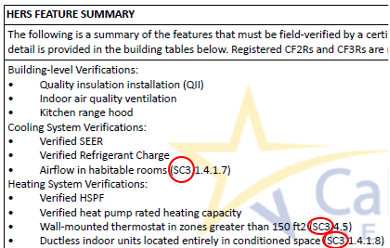
Under the Residential Energy Code, new construction, variable capacity heat pumps (VCHP), commonly known as “mini-splits” are potentially available for a Title 24 ‘energy credit’ under the Performance Method, but there are several requirements that require attention.
Every new code cycle presents new requirements and verifications that can be included in design and construction. One of the HERS Verifications for credit we see being taken more frequently is the Variable Capacity Heat Pump (VCHP).
Although it is easy for a Title 24 consultant to select this “Verification for Compliance” credit on the Title 24 report to help a project meet compliance thresholds, there are important impacts to the design and construction to implement the credit. Without knowing the project ramifications, the VCHP credit could put the contractor and/or HERS rater in a bind, often costing the client change orders or add services. Plans examiners and inspectors can also keep a close eye on this and other required HERS verifications, to help reduce friction at construction sign-off.
The official (CEC) information can be found at, energy.ca.gov/rules-and-regulations/building-energy-efficiency. There you will find:
- Protocol document, Appendix B: Eligibility Verification Protocols
- Excel doc of VCHP Ducted Systems Certified to the Energy Commission
- Additional language straight from the CEC
Overview of Credit Requirements
This credit is relevant for Single-Family projects only. You’ll find the credit on the Title 24 Report under “Required Special Features,” typically on Page 3.

The VCHP credit also triggers additional HERS Verifications under the HERS Feature Summary. In the table shown, each verification that references “SC3…” is associated with the VCHP verification credit.

Differences for Ducted or Ductless
This credit is available for both ductless and ducted systems. Ducted systems have additional requirements; they are required to be certified by the energy commission.
Ductless: The VCHP Credit requires a HERS inspection during construction and includes the following verifications:
- Verified refrigerant charge
- Verified minimum HSPF and EER/SEER, and capacity
- Ductless indoor units and the components are within the conditioned envelope
- Wall mount thermostat(s) in each zone greater than 150 sf
- Airflow provided to all habitable spaces, i.e., each bedroom and the main living space(s).
Ducted: For ducted mini-split systems additional requirements must be met:
- Ducts must be installed completely within the conditioned envelope
- The air-handler fan must be certified to the State of California*, to have an automatic fan that will turn off when the space(s) are not calling for heating or cooling
*Download a list of VCHP manufacturers certified to the CA Energy Commission at energy.ca.gov/rules-and-regulations/building-energy-efficiency
What to Watch For
When taking this credit as part of a project’s method to compliance it is important to do the following.
- Confirm that the specified equipment matches the Efficiencies and Capacities that are called out on the Title 24 Document
- Confirm that the unit is on the VCHP Registry, if utilizing a Ducted system
- Coordinate between project manager and installing contractor that:
- Installation includes wall-mounted thermostats in each zone greater than 150 sf
- Ducting is installed within the conditioned envelope
- Communicate with the project’s HERS rater that:
- VCHP is required and
- HERS verifications need to be scheduled at the right time to avoid changes (typically when the units are first being installed and not waiting until the end of construction)
Conclusion
Special requirements and HERS verification of Variable Capacity Heat Pump features is a useful tool for increasing energy efficiency in residential projects and complying with the Title 24 Energy Efficiency Standard. Having a full understanding of those requirements, however, and clear communication among all members of the team is critical to reduce potential conflicts in the field and streamline a clean sign-off.
To help navigate these requirements, exemptions, or any other energy code question, please reach out to an Energy Code Coach.
Submit online: www.3c-ren.org/energy-code-connect
or call: (805) 781-1201
